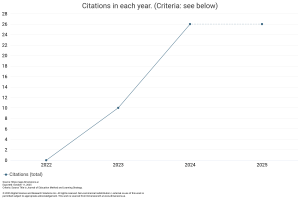The Relationship between Learning Independence and Learning Motivation with Student Academic Achievement
DOI:
https://doi.org/10.59653/jemls.v1i01.11Keywords:
learning independence, learning motivation, academic achievement, learning achievementAbstract
Learning independence and learning motivation is very important to student academic achievement. Many efforts have been made to improve student achievement in the Nursing Diploma Study Program at the University of Timor, but the results have not been as expected. This study aims to identify the relationship between learning independence and learning motivation with the academic achievement of students of Unimor Nursing Study Program. The method used is descriptive and correlative with the cross-sectional approach. The sample was Unimor Nursing Diploma Study Program students, recruited by a total sampling of 46 people. The results showed that forty-six students of the Nursing Study Program at the University of Timor completed a questionnaire containing a Liker scale of 1-5 for learning independence and learning motivation. Student academic achievements are obtained from the academic division of the Nursing Diploma Study Program. Pearson Chi-Square analysis at an alpha of 0.05 shows that there is no relationship between learning independence and learning motivation with student academic achievement [p-value> 0.05]. The conclusion is that there is no relationship between learning independence and learning motivation with the academic achievement of students of the University of Timor Nursing Study Program.
Downloads
References
Chen, T. L., Lee, Y. C., & Hung, C. Sen. (2022). A Study on the Effects of Digital Learning Sheet Design Strategy on the Learning Motivation and Learning Outcomes of Museum Exhibition Visitors. Education Sciences, 12(2). https://doi.org/10.3390/educsci12020135
Cheng, C. H., & Chen, C. H. (2022). Investigating the impacts of using a mobile interactive English learning system on the learning achievements and learning perceptions of student with different backgrounds. Computer Assisted Language Learning, 35(1–2). https://doi.org/10.1080/09588221.2019.1671460
Devi Febrianti, Ira Megasyara, & Ninik Mas’adah. (2022). Exploration of the Implementation of PKL in Achieving MBKM Goals in Accounting Study Program. International Journal of Science, Technology & Management, 3(1). https://doi.org/10.46729/ijstm.v3i1.437
Hasanah, E., Desstya, A., Kusumawati, I., Limba, A., & Kusdianto. (2022). The Mediating Role of Student Independence on Graduate Quality in Distributed Learning. International Journal of Instruction, 15(2). https://doi.org/10.29333/iji.2022.1524a
Henschel, L., Kügler, D., & Reuter, M. (2022). FastSurferVINN: Building resolution-independence into deep learning segmentation methods—A solution for HighRes brain MRI. NeuroImage, 251. https://doi.org/10.1016/j.neuroimage.2022.118933
Liu, Z., Zhang, N., Peng, X., Liu, S., Yang, Z., Peng, J., Su, Z., & Chen, J. (2022). Exploring the Relationship Between Social Interaction, Cognitive Processing and Learning Achievements in a MOOC Discussion Forum. Journal of Educational Computing Research, 60(1). https://doi.org/10.1177/07356331211027300
Low, D. Y. S., Poh, P. E., & Tang, S. Y. (2022). Assessing the impact of augmented reality application on students’ learning motivation in chemical engineering. Education for Chemical Engineers, 39. https://doi.org/10.1016/j.ece.2022.02.004
Mathis, B. J., Mayers, T., & Miyamasu, F. (2022). English as a vocational passport: Japanese medical students and second language learning motivation. Education Sciences, 12(1). https://doi.org/10.3390/educsci12010008
Pangesti, W. N., Haenilah, E. Y., & Efendi, U. (2022). Hubungan Pola Asuh Over Protective Orang Tua dengan Perilaku Bullying dan Kemandirian Belajar Peserta Didik. Pedagogi: Jurnal Pendidikan Dasar, 9(2). https://doi.org/10.23960/pdg.v9i2.23176
Role, M. T. B., Kurniawan, A., & Cendana Sari, T. Y. (2022). Efektivitas Pembelajaran Online Mata Kuliah Filsafat Pendidikan Menggunakan Google Classroom di Masa Pandemi Covid-19. Cetta: Jurnal Ilmu Pendidikan, 5(1). https://doi.org/10.37329/cetta.v5i1.1549
Septantiningtyas, N., & Nisa’, A. K. (2022). Intensive Self-Efficacy Dengan Kemandirian Belajar Siswa Di Era Pandemi Covid-19. MANAZHIM, 4(1). https://doi.org/10.36088/manazhim.v4i1.1595
Sujono, I., Malaka, Z., Istifhama, L., Nasiri, N., & Anah, S. (2022). Efforts to Strengthen Islamic Moderation of Islamic Religious Universities in Indonesia. Proceedings of the 6th Batusangkar International Conference, BIC 2021, 11 - 12 October, 2021, Batusangkar-West Sumatra, Indonesia. https://doi.org/10.4108/eai.11-10-2021.2319459
Tetiana, P., & Vsevolod, Z. (2022). Implementation of Information and Communication Technologies in the Process of Future Psychologists’ Training in Consideration of Their Learning Motivation. International Journal of Information and Education Technology, 12(4). https://doi.org/10.18178/ijiet.2022.12.4.1626
Wang, H., Jiang, X., Wu, W., & Tang, Y. (2022). The effect of social innovation education on sustainability learning outcomes: the roles of intrinsic learning motivation and prosocial motivation. International Journal of Sustainability in Higher Education. https://doi.org/10.1108/IJSHE-07-2021-0285
Wulanningtyas, N. D., & Fauzan, F. (2022). the Influence of Creativity and Learning Motivation on Students’Learning Independence With Friend Support As Moderating Variables. International Journal of Social and Management Studies, 3(1).
Zhao, X., Liu, M., & Liu, Y. (2022). The Influence of Different Learning Strategies on Pupils’ Learning Motivation: Is Augmented Reality Multimedia Learning Consistent With Traditional Text Learning? Frontiers in Psychology, 13. https://doi.org/10.3389/fpsyg.2022.810345
Zhu, Y., Xu, S., Wang, W., Zhang, L., Liu, D., Liu, Z., & Xu, Y. (2022). The impact of Online and Offline Learning motivation on learning performance: the mediating role of positive academic emotion. Education and Information Technologies, 27(7). https://doi.org/10.1007/s10639-022-10961-5
Downloads
Published
How to Cite
Issue
Section
License
Copyright (c) 2023 Abdullah Isa

This work is licensed under a Creative Commons Attribution-ShareAlike 4.0 International License.
Authors who publish with this journal agree to the following terms:
- Authors retain copyright and grant the journal right of first publication with the work simultaneously licensed under a Creative Commons Attribution-ShareAlike that allows others to share the work with an acknowledgement of the work's authorship and initial publication in this journal.
- Authors are able to enter into separate, additional contractual arrangements for the non-exclusive distribution of the journal's published version of the work (e.g., post it to an institutional repository or publish it in a book), with an acknowledgement of its initial publication in this journal.
- Authors are permitted and encouraged to post their work online (e.g., in institutional repositories or on their website) prior to and during the submission process, as it can lead to productive exchanges, as well as earlier and greater citation of published work (See The Effect of Open Access).
























